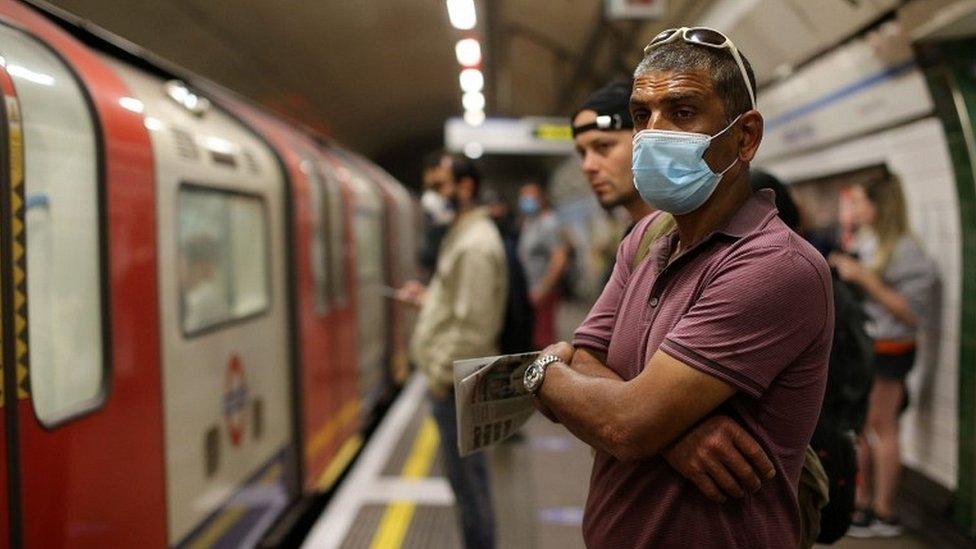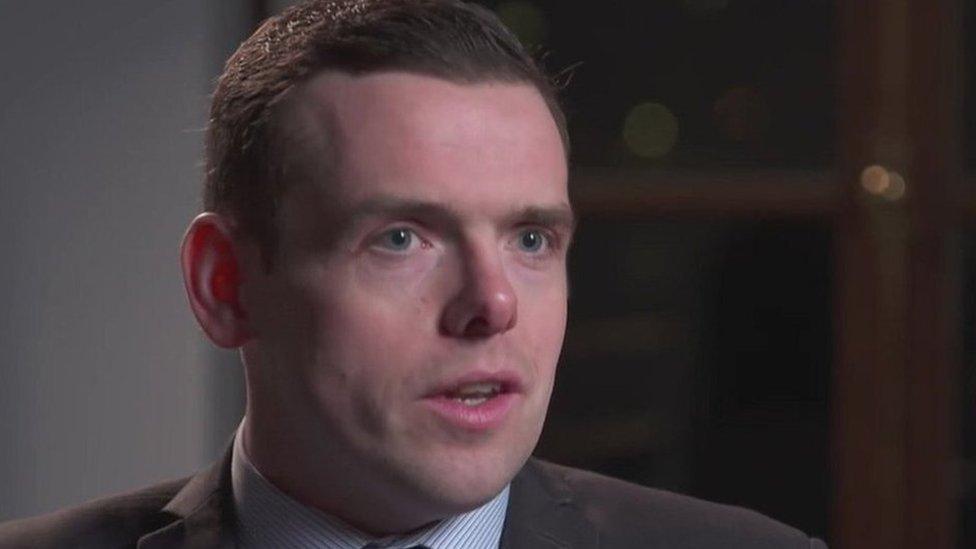Dominic Cummings: Most voters think aide broke rules, survey suggests
- Published

YouGov asked voters if they thought Dominic Cummings had breached lockdown guidance
The number of people who believe the prime minister's senior aide Dominic Cummings should resign after he drove 260 miles during lockdown increased following the news conference he gave on Monday, a poll has suggested.
According to snap research by polling company YouGov, 59% of voters believe he broke coronavirus rules and should resign. A similar poll, carried out before his press conference, found 52% thought he should go.
Some 71% of those surveyed said Mr Cummings had breached regulations.
The online poll of more than 1,000 people was conducted at the height of the row over the prime minister's aide's decision to drive his child and ill wife from London to County Durham in March.
Boris Johnson has backed Mr Cummings, saying he acted reasonably and legally.
On Monday, Mr Cummings said at a Downing Street news conference that he did not regret his actions and believed he acted reasonably.
Separate research by polling company Savanta suggests Mr Johnson's net approval rating has fallen from +19% on Friday to -1%.
The findings come amid increasing pressure on the prime minister, who has stood by his senior advisor.
"Boris Johnson has lost credibility": Public on government handling of lockdown and Cummings row
Lockdown attitudes
Meanwhile, the latest wave of an attitudes survey conducted by King's College London suggests trust and confidence in the government's handling of the coronavirus emergency was declining even before the row over Mr Cummings broke.
The poll compares attitudes at the end of last week with opinions at the beginning of April, a week after the lockdown was introduced.
Seven weeks ago, more than two-thirds (69%) of people said they trusted the government to control the spread of the virus. The new poll suggests that has now fallen to 51%.
The survey finds a similar fall in the proportion of people who think government advice about the virus is helpful or effective.

The poll asked people if they were nervous about returning to their work
Trust in what the government is saying about the virus also appears to have fallen, the survey suggests. In early April, 76% of people surveyed said they trusted official information. Now, the equivalent figure is 59%.
When it comes to plans to ease the restrictions in England, more than half (54%) thought the controls were being lifted too quickly, with just 13% wanting lockdown lifted faster.
A significantly greater proportion of people said it was more important to control Covid-19 than restore lost freedoms.
Some 24% thought the restrictions were doing more harm than good but more than double that proportion (59%) thought the country should adopt whatever measures were necessary to stop the virus from spreading.
Primary schools
Among parents of school-age children, only a third (33%) appear "comfortable" about sending them back to the classroom. More than half (56%) said they were "uncomfortable" about the idea.
Primary schools in England are due to start lessons for some classes on 1 June, although teachers' unions have expressed concerns about safety, and the prime minister has accepted that not all will be ready to open as intended.
A substantial minority of working adults (41%) said they were uncomfortable about the prospect of returning to work, although a slightly greater proportion (44%) reported being comfortable.
Separate surveys conducted by the Office for National Statistics in April and early May suggest 80% of adults were worried at the effect coronavirus was having on their life. This varied regionally, from 76% in Scotland and the East Midlands, to 87% in the North East of England.
One group of people with particularly high levels of anxiety were people aged 16 to 34 in the North East of England with 94% saying they were worried or very worried.
Almost one-third of people surveyed said they lived with someone who self-isolated because of the coronavirus pandemic during April.

A SIMPLE GUIDE: What are the symptoms?
RISK AT WORK: How exposed is your job?
HOW A VIRUS SPREADS: An explanation
RECOVERY: How long does it take to get better?
GLOBAL SPREAD: Tracking the pandemic

- Published26 May 2020
